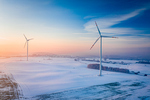News Release from WindEurope
Wind Industry Profile of
Europe's €36bn industrial success story: but for how long?
These are the main findings of a new report, ‘Local Impact, Global Leadership’ carried out by Deloitte for WindEurope and published today. The report also outlines what the wind industry saves Europe in terms of reduced fossil fuel imports (€32bn from 2011-2016) and CO? emissions (166 million tons of CO? in 2016) and what it contributes to government tax revenues (€4.9bn in 2016).
The report shows how wind energy creates value not only for the wind industry but for the wider economy. Every €1,000 of turnover generated in the wind industry generates €250 of economic activity in other sectors such as metals, chemicals, electrical equipment and machinery, construction and engineering. Much of the industry and supply chain is located in economically less-advantaged areas. And it brings quality jobs to those areas: 82% of the 263,000 jobs are high-skilled.
Wind farms also bring direct benefits to the communities where they're located, whether through local citizens sharing the revenues through community ownership or the operators paying local taxes to the town or district authorities.
That's the good news. The less good news is that Europe's really got its work cut out to maintain this success. Job growth in the industry has flat-lined in the last five years as many countries have become less ambitious on renewables: half the EU Member States invested nothing in wind last year. Net exports of wind equipment are falling in the face of strong competition from emerging economies: down from €3bn in 2011 to €2.4bn today. This is due to European turbine manufacturers sourcing more components from outside Europe. The policy ambition and clarity needed to sustain wind's contribution to the European economy is currently not in place.
“Wind is a smart choice for the economy. It's a European industrial success story. But it's at risk. Clear and ambitious targets and policies are essential to sustain the jobs and growth our industry supports," said Giles Dickson, WindEurope CEO. “We need an EU renewables target of at least 35% by 2030. We need clarity on post-2020 volumes so the supply chain knows what to invest and where. We need R&D and industrial policies that help Europe maintain its technology lead and continue to export. If all this happens, wind could meet 30% of Europe’s power needs in 2030 and we'd generate more jobs and growth for the economy. But if it doesn't, Europe will miss out on €92bn of investments and 132,000 jobs: that's the cost of non-ambition. What's more, ambition costs less than the alternatives: onshore wind is the cheapest form of new power in most EU countries; offshore wind isn't far behind, with costs falling over 60% in three years."
“Renewable energy policy means industrial policy – wind energy is making major contributions to economies on a national and international level. The main requirement for the wind industry and green, sustainable growth in Europe is a stable, reliable and long-term political framework post-2020. Visibility is crucial to industrial planning. When we see significant volumes in a market or a region, we invest in the supply chain as it provides economies of scale,” said Hans-Dieter Kettwig, Managing Director, ENERCON.
“The challenges of climate change, energy security and Europe’s industrial stability are more intense than ever before. Wind power is an important part of the solution as it has already soundly proven – locally and globally. Our new offshore manufacturing facilities in Hull (UK) and Cuxhaven (Germany) are a good example for bringing employment back to coastal regions and contributing to re-industralisation. To continuously offer wind power at the lowest possible cost of energy, our industry needs a long-term vision, a stable framework and sufficient volumes,” said Markus Tacke, CEO, Siemens Gamesa Renewable Energy.
“Subsidy-free is not policy-free. In times of first subsidy free wind projects, we need to discuss with European policy-makers how the regulatory environment for renewable energy can support both competitive renewable energy and a firm social and political outlook for the energy transition. Both are closely linked and cannot be discussed and deployed separately. These are issues we need to address if we are to further the local impact and global leadership of wind energy in Europe,” said Gunnar Groebler, Senior Vice President – Head of Business Area Wind, Vattenfall.
“The wind industry is key to lowering greenhouse gas emissions and has dramatically lowered the cost of wind energy, creating jobs and investments and contributing directly and indirectly to a huge range of industries in Europe. Wind energy is cheaper than many fossil fuels and it’s time for the EU to review its 2030 renewable energy target and raise it to at least 35 per cent. On top of that, we need to continue working on adapting markets, policies and public infrastructure to reflect a future energy system with more renewables. By doing so, the sector will continue to grow, create jobs and investments, and a more sustainable energy mix,” said Anders Runevad, Group President & CEO, Vestas.
The report was issued today at the WindEurope Conference & Exhibition in Amsterdam. Find out more: https://windeurope.org/about-wind/reports/local-impact-global-leadership/
- Source:
- WindEurope
- Link:
- www.windeurope.org/...
- Keywords:
- Windeurope, jobs, exports, Deloitte









